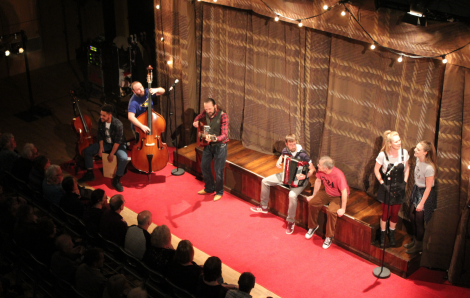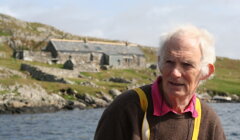Reviews / ‘The best and most important performance Mareel has ever seen’
The Cheviot, the Stag, and the Black, Black Oil, which blew away the audience in Mareel on Thursday night, is an extremely difficult performance to explain, writes Alex Garrick-Wright.
Trying to define it is a fruitless task, but in short, it was the best – and most important – performance Mareel has ever seen.
Equal parts panto, musical, history lesson, comedy, tragedy and music hall, the play was far more than the sum of its parts, or of the combined talents of its incomparable cast.
Originally written and performed in 1973 by John McGrath – and here performed by the National Theatre of Scotland – The Cheviot remains as powerful, enlightening and profound as when it was first performed.
Some of Mareel’s audience, packed before the specially-constructed stage, knew what they were in for. A number of attendees had experienced the play during its original run, and were no doubt keen to see it with fresh eyes. For the rest, it started off on the right foot, with a small yet lively ceilidh.
Audience members were literally taken from their seats to take part in a Canadian barn dance at the foot of the stage, while fiddle blazed and the double bass moved around with the polka-ing couples, simply because there was no room for the bassist to stand.
At its heart, The Cheviot is a whistle-stop history lesson in the exploitation of the Scottish land and people, delivered in the three stages of the title; the clearances of the Highlands and Islands to make way for cheviot sheep, the conversion of the Highlands into stag hunting playgrounds for the gentry, and the discovery and plundering of the black, black oil in the North Sea by American companies, aided and abetted by a feckless Westminster.
Summarising the play beyond this would only do it an injustice. Telling this history, it oscillates between the hilarious and the upsetting – often scene by scene. Moments of high farce, such as the gleeful pantomime where a ‘sturdy heilan man’ wearing a tartan boat is stalked by a villainous French Canadian trapper decked in coonskin cap and onions, are followed by chilling horror as the Hudson Bay Company sends more and more Highlanders to the colonies to work the land for no profit.
Become a member of Shetland News
Highlights were many, as the NTS’s cast – Alastair Macrae, Billy Mack, Callum MacDonald, Christina Gordon, Jo Freer, Reuben Joseph and Stephen Bangs – worked miracles. Each of them was a magnificent actor and musician, and every one had a genuine stand-out moment.
Stephen Bangs’ chilling hell-and-damnation speech as a kirk minister siding with the landowners over the highland peasantry was magnificent, as was Alastair Macrae’s hilarious and depressing Texas oil baron, singing in the style of Elvis Presley about the wonders of oil exploitation (complete with blistering fiddle work), and Jo Freer and Christina Gordon’s excellent Gaelic-language scenes.
Quite a lot of the play was in Gaelic, actually, which goes almost entirely untranslated. Only Callum MacDonald, who hails from Uist, is an actual Gaelic speaker, and he had a number of passionate moving monologues that only he and the one Gaelic speaker in the audience could possibly understand.
This was an admirable artistic choice that the other cast members explained in the latter half of the play; the speaking of Gaelic was suppressed to near extinction by the establishment. While once a great deal of the population would have spoken it, now only two in the entire of Mareel could.
Admittedly the point was a little lost on a Shetland audience, but the message stood clear; “There are bits of this play that by all rights you should be able to understand, but this was taken from you.” Other languages, they noted, suffered the same fate; including the native Norn of Shetland.
No matter how funny the play was (and it was ludicrously funny), nor how genuinely brilliant the music, it was the truth underpinning it all that sticks in the mind. The upsetting moments where the cast each read genuine accounts of the violence and oppression dealt to the peasantry standing up for themselves were haunting.
In particular, a moment when all the women were asked to stand, and a series of passages were read describing the (often horrific) injuries dealt to the women of some villages who resisted the clearances – the menfolk, the audience were told, never once took the front lines.
By far the most memorable scene was the genuinely disturbing and harrowing depiction of the Duke of Sutherland’s factor (Billy Mack) ordering the eviction of a family with a 95-year-old grandmother (Reuben Joseph) inside. The Sheriff’s Officer quits rather than cast her out to her death, so the factor burns the croft.
As the match was struck, the lights in the auditorium went out, all eyes focused on the flickering flame, and the curtains draw back to reveal a hunched figure in a tattered shawl. The match is set to the chair, and smoke begins to billow out from the shawl, as the figure convulses and screams, and Christina Gordon strikes up a soul-wrenching lament in Gaelic. Chilling.
The play’s narrative ends in the 1970s, with the UK Government more-or-less handing the oil and all its profits over to a wide array of foreign-based companies, squandering any potential it had to enrich the lives of the common people.
This section of the play possibly hit harder than the rest to a Shetland audience, and there may have been some uncomfortable shifting in chairs as attendees who have personally benefitted from the oil boom were confronted with the genuinely shocking exploitation of our resources, for the vast enrichment of the very few.
The Cheviot, the Stag and the Black, Black Oil remains as much of a masterpiece today as when it was first performed 46 years ago; a stirring, heartfelt and hilarious tour de force that received a raucous standing ovation.
It’s not enough to say that more people in Shetland should have seen this play; it ought to be seen by every single man, woman and child in the country. A toe-tapping, side-splitting, heart-breaking triumph that will surely be fondly remembered for another 46 years at least.
Become a member of Shetland News
Shetland News is asking its readers to consider paying for membership to get additional perks:
- Removal of third-party ads;
- Bookmark posts to read later;
- Exclusive curated weekly newsletter;
- Hide membership messages;
- Comments open for discussion.
If you appreciate what we do and feel strongly about impartial local journalism, then please become a member of Shetland News by either making a single payment, or setting up a monthly, quarterly or yearly subscription.














































































